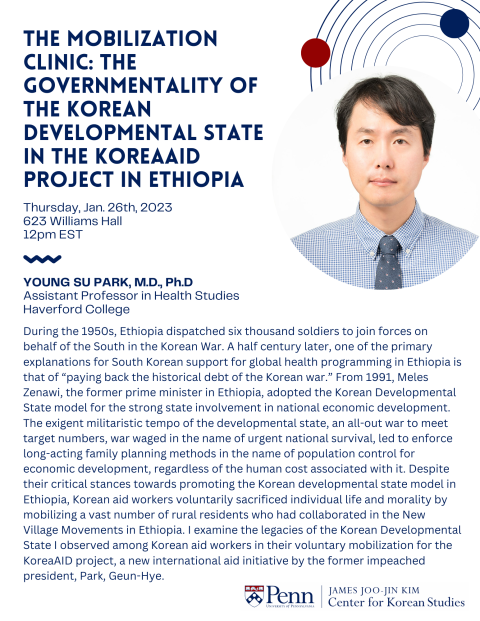
Korean Studies Colloquium
623 Williams Hall
During the 1950s, Ethiopia dispatched six thousand soldiers to join forces on behalf of the South in the Korean War. A half century later, one of the primary explanations for South Korean support for global health programming in Ethiopia is that of “paying back the historical debt of the Korean war.” From 1991, Meles Zenawi, the former prime minister in Ethiopia, adopted the Korean Developmental State model for the strong state involvement in national economic development. The exigent militaristic tempo of the developmental state, an all-out war to meet target numbers, war waged in the name of urgent national survival, led to enforce long-acting family planning methods in the name of population control for economic development, regardless of the human cost associated with it. Despite their critical stances towards promoting the Korean developmental state model in Ethiopia, Korean aid workers voluntarily sacrificed individual life and morality by mobilizing a vast number of rural residents who had collaborated in the New Village Movements in Ethiopia. I examine the legacies of the Korean Developmental State I observed among Korean aid workers in their voluntary mobilization for the KoreaAID project, a new international aid initiative by the former impeached president, Park, Geun-Hye.
Young Su Park is Assistant Professor in Health Studies at Haverford College. Dr. Park is a physician anthropologist trained in the humanistic tradition with an interdisciplinary background that combines Medical Anthropology, Global Health, Humanitarian Studies, African Studies, and Korean Studies. His scholarship speaks to critical approaches to ethics, trauma and mental health, reproductive health, the historicity and temporality of global health, and genealogy of modernities in Africa. He undertook ethnographic fieldworks on historical memory and violence of East Asian modernities and South Korean global health projects in Ethiopia. His research seeks to explain how global health projects are shaped by ideas and experiences related to modernization, national development, and historical memories, contributing to critical understanding of global health from the lens of time. His past works involves researches on healthcare system for undocumented migrants, cultural adjustment of North Korean refugee doctors, illness experiences of Korean Chinese migrant workers in South Korea, and socially vulnerable groups during the Covid-19 pandemic. Previously, he was a postdoctoral researcher at Freie Universität Berlin and University College London.
 James Joo-Jin Kim Center for Korean Studies
James Joo-Jin Kim Center for Korean Studies